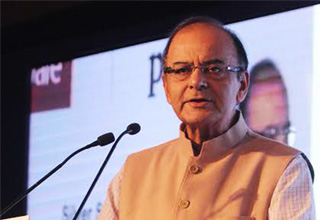India's growth architecture focuses on reforms for allowing businesses to prosper: FM
Updated: Sep 17, 2015 02:25:47pm

He was addressing the global and Indian CEOs at the 'India Economic Convention 2015' on the theme, 'Architecture for Growth', organised by India Foundation in association with the International Chamber of Commerce (ICC), whose India Chapter is an affiliate body of FICCI.
Jaitley said the country's electorate gave a massive mandate for governance to a single party in the last general elections and this had made the Prime Minister's Office the final arbiter in decision-making, in stark contrast to the policy paralysis witnessed during the past decade due to the marginalisation of the PMO, where decision-making lay with those outside the government.
The Finance Minister said that the present government was totally clear on the direction that economic governance of the country needs to take.
"We have sought to restructure the model of governance which takes the burden of employment off a fragile agriculture sector; one which forces the pace of development of the services and urban sector and builds a vibrant manufacturing sector,” he said.
Jayant Sinha, Minister of State for Finance, in his address, dwelt on how the growth model adopted by the government was different from that of the past. "Our government wants to build India's productive capacity to achieve and sustain an 8-10 per cent growth steadily through boom and bust cycles. Our approach is to power growth through supply-side interventions and investments, rather than a consumption-led, demand-side orientation."
He said that the present government was pro-poor, pro-market. It believed in empowerment, not entitlement, cooperative federalism and was committed to 'minimum government, maximum governance'.
Sunil Bharti Mittal, Chairman, Bharti Enterprises and ICC First Vice Chairman, exhorted Indian and global investors to cash in on the opportunities that have opened up through the launch of programmes such as Make in India, Digital India, Skill India and 'Swachch Bharat Mission'.
He said the government is committed to bringing the manufacturing sector out of the backstage and told the delegates that there is a huge opportunity to build businesses around these programmes."
He said that India had emerged virtually unscathed from the global economic turbulence with an expected growth rate of 7.2 per cent, going up to 7.5 per cent in the not too distant future. This, he added, was made possible because of India's large market and an aspirational population of over 1.2 billion people.
Binod Bawri, Director, India Foundation, gave an overview of the Foundation's activities in addressing the challenges to make a lasting impact on society and Sandip Somany, Joint Managing Director, HSIL Ltd. & President, ICC India, expressed confidence that India would emerge stronger from the global economic turmoil due to the government's pro-market, supply-side approach to governance. He offered ICC India's full commitment to the government's economic initiatives. (KNN Bureau)












